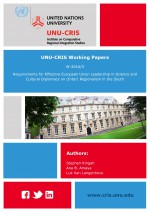Global Constitutionalism in Global Health Governance and Regional Responses: Exploring African and Latin American Compulsory License Regimes
This paper discusses conditions under which a regional compulsory license (CL) regime can be feasible and useful for African and Latin (especially) South American regional organizations. We focus on the African Union (AU), the Southern African Development Community for Africa (SADC) and the Union of South American Nations (UNASUR) for Latin America. International legal patenting of medicines and vaccines have in certain instances negatively affected access especially for the most vulnerable. Leaning on global constitutionalism we argue that regional CLs can play a significant role in enhancing the social equity dimensions of international legal patenting of medicines and vaccines. Our paper unveils the meaning of CL with the aim of better understanding the specific needs served by a mechanism that derogates monopoly rights of patent owners. It also considers the current state of affairs in terms of the use of such licenses in countries of the two regions studied (Africa and South America). A canvass is painted of the state of play of regional pharmaceutical policies with emphasis on the role accorded CLs in them. Conditions under which a regional compulsory licensing regime would be deemed successful are articulated with a clear appreciation of the challenges that can undergird their unrestrained use.

